When I first joined Quicklaw, it was a small, family-run business. It was headed by a law professor who used modern technology to provide lawyers with better access to legal information. Then Quicklaw was acquired by LexisNexis, and I suddenly found myself working for a large, multinational corporation (RELX) with 30,000 employees in 40 countries.

The RE Cares Mission is to promote the education of disadvantaged young people.
One of the great things about working for RELX is RE Cares, its robust corporate social responsibility program. The RE Cares Mission is to promote the education of disadvantaged young people. Every full-time employee can volunteer up to two working days per year, during regular business hours. RE Cares hours do not count against one's vacation entitlement. Many business units within RELX also have employee gift-matching programs. LexisNexis Canada matches employee donations to registered charities, up to $1,000 (USD) per employee, per calendar year. In addition, employees are encouraged to support their favourite charities by applying for RELX grants. Each year, the company disburses hundreds of thousands of dollars to recipient organizations around the world. To be eligible, an organization must advance the education of disadvantaged young people. Despite our relatively small size within RELX, LexisNexis Canada has successfully applied for several of these grants. Our recipients have included CLEW (Cambodian Legal Education for Women), Level and the equality effect.
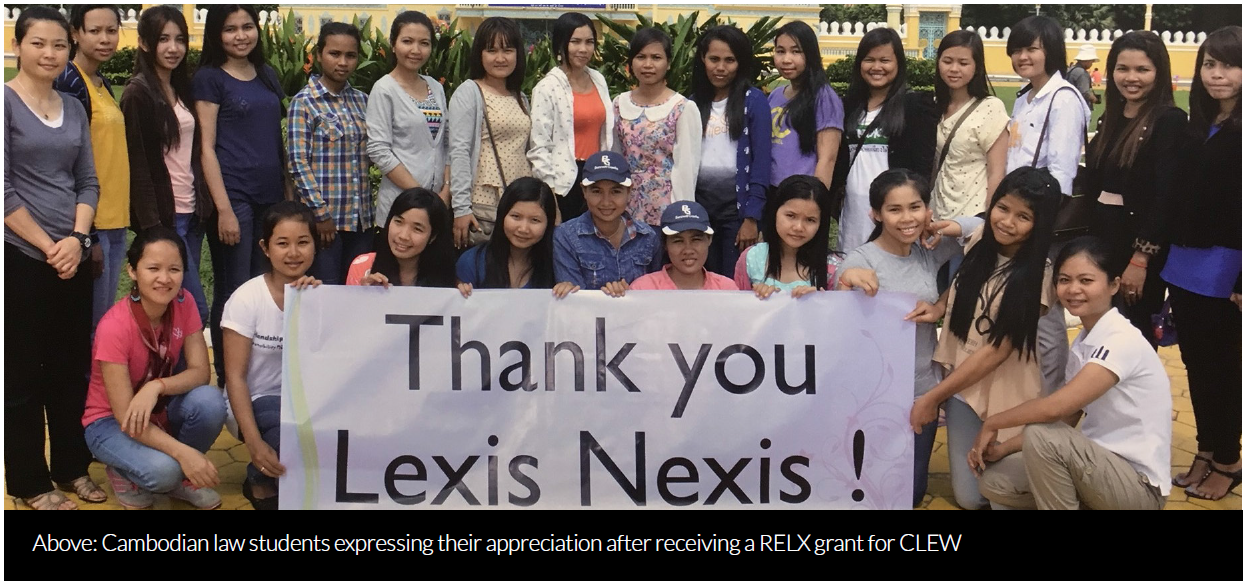
In 2011, under the leadership of RELX Director of Corporate Responsibility Marcia Balisciano, the company launched a global program called Recognizing Those Who Care. Each year, RELX chooses eight employees who are especially dedicated to the RE Cares Mission. The group spends a week in a developing country (such as India, Ghana and Honduras), working with some of the local nongovernmental organizations (NGOs) supported by RELX. Participants also share ideas with colleagues from around the world, and learn from senior business leaders. YS Chi, the Chairman of Elsevier, has taken time out of his busy schedule to attend every one of these trips.
This trip of a lifetime gave us the opportunity to work with some extraordinary charitable organizations.
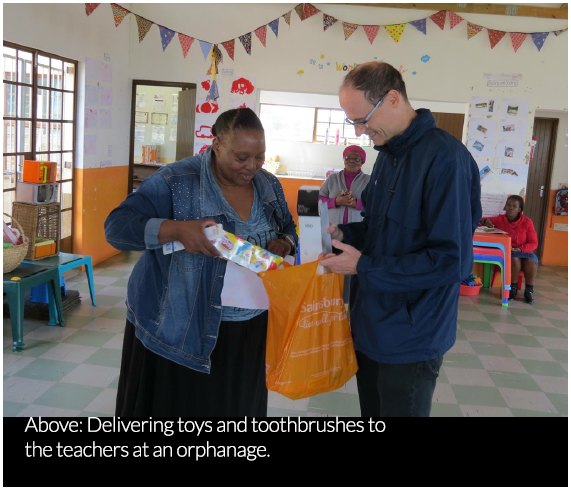 I was among the fortunate employees selected for last year's Recognizing Those Who Care trip. We spent a week in Durban, where LexisNexis South Africa is based. This trip of a lifetime gave us the opportunity to work with some extraordinary charitable organizations. For example, we delivered toys and toothbrushes to the children at a crèche (orphanage) operated by iThema Lethu. The crèche is nestled in the picturesque Valley of a Thousand Hills, which also hosts the Comrades Marathon – the world's oldest and largest ultramarathon.
I was among the fortunate employees selected for last year's Recognizing Those Who Care trip. We spent a week in Durban, where LexisNexis South Africa is based. This trip of a lifetime gave us the opportunity to work with some extraordinary charitable organizations. For example, we delivered toys and toothbrushes to the children at a crèche (orphanage) operated by iThema Lethu. The crèche is nestled in the picturesque Valley of a Thousand Hills, which also hosts the Comrades Marathon – the world's oldest and largest ultramarathon.
We also met with Open Door Crisis Care Centre founder Thora Mansfield and her extraordinary team of social workers. Open Door provides counselling and other resources for victims of domestic violence and child abuse. I never would have predicted that I would be singing and dancing with them, both in their office and at a community outreach event.
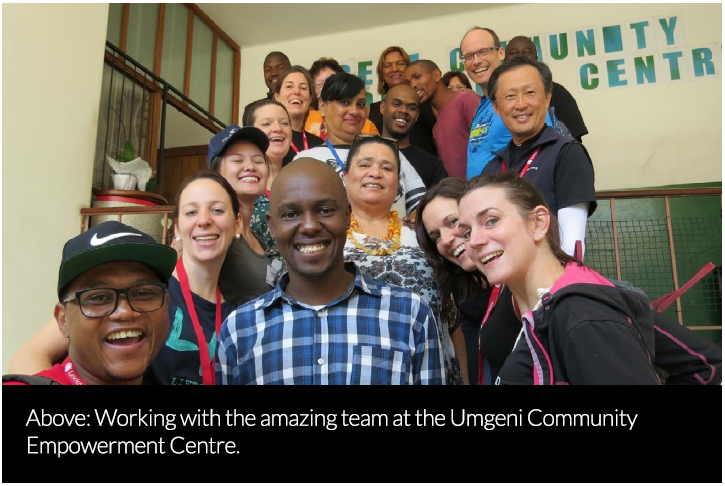 One of my personal highlights was our visit to the Umgeni Community Empowerment Centre (UCEC), where we helped to cook and serve lunch to people in need and handed out bags of groceries. I have volunteered at soup kitchens for nearly 20 years, but I had never seen so many homeless people, especially children, at one meal. It was heartbreaking, but it affirmed the importance of UCEC's work. During lunch, I agreed to give a motivational speech about my years volunteering with Lawyers Feed the Hungry in Toronto. I told them that some of our guests needed help to make ends meet for a while, but they eventually got jobs and became financially self-sufficient. I talked about the lessons I've learned from running marathons: keep pushing yourself towards the finish line, and never give up. That seemed to resonate with the audience, including one man who told me that he wanted to run Comrades one day.
One of my personal highlights was our visit to the Umgeni Community Empowerment Centre (UCEC), where we helped to cook and serve lunch to people in need and handed out bags of groceries. I have volunteered at soup kitchens for nearly 20 years, but I had never seen so many homeless people, especially children, at one meal. It was heartbreaking, but it affirmed the importance of UCEC's work. During lunch, I agreed to give a motivational speech about my years volunteering with Lawyers Feed the Hungry in Toronto. I told them that some of our guests needed help to make ends meet for a while, but they eventually got jobs and became financially self-sufficient. I talked about the lessons I've learned from running marathons: keep pushing yourself towards the finish line, and never give up. That seemed to resonate with the audience, including one man who told me that he wanted to run Comrades one day.
After my talk, the guests asked me very thoughtful questions. Some of them stumped me; I had to admit that I didn't know Canada's GDP off the top of my head! The intelligence and eloquence of the guests at UCEC are what I've come to expect from my time spent in soup kitchens.
Another highlight of this trip was meeting extraordinary colleagues from around the world, including the U.S., U.K., Germany, Netherlands and the Philippines. One member of the group suggested that we continue to support the NGOs we had visited in Durban after we all returned home. Shortly after I got back to Toronto, LexisNexis Canada raised $1,000 for Open Door with an office potluck. And this past June, we successfully applied for a RELX grant for UCEC. They received $15,000 USD to conduct a national education and awareness campaign against human trafficking.
Another highlight of this trip was meeting extraordinary colleagues from around the world.
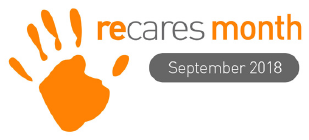 September is Global RE Cares Month, when RELX employees are encouraged to use their volunteer hours to support their favourite charities. This year, LexisNexis Canada will offer its employees a variety of volunteer and fundraising activities. I will participate in many of them, but I will also be thinking about the great charitable work being done by my friends and colleagues around the world, whom I met last fall in South Africa.
September is Global RE Cares Month, when RELX employees are encouraged to use their volunteer hours to support their favourite charities. This year, LexisNexis Canada will offer its employees a variety of volunteer and fundraising activities. I will participate in many of them, but I will also be thinking about the great charitable work being done by my friends and colleagues around the world, whom I met last fall in South Africa.

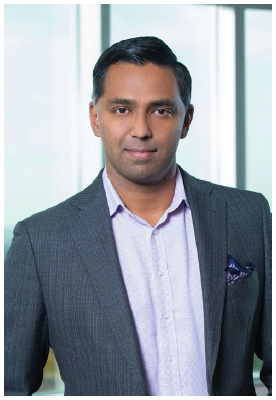

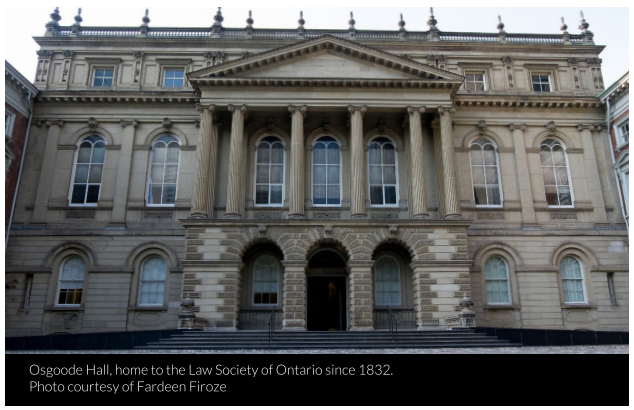
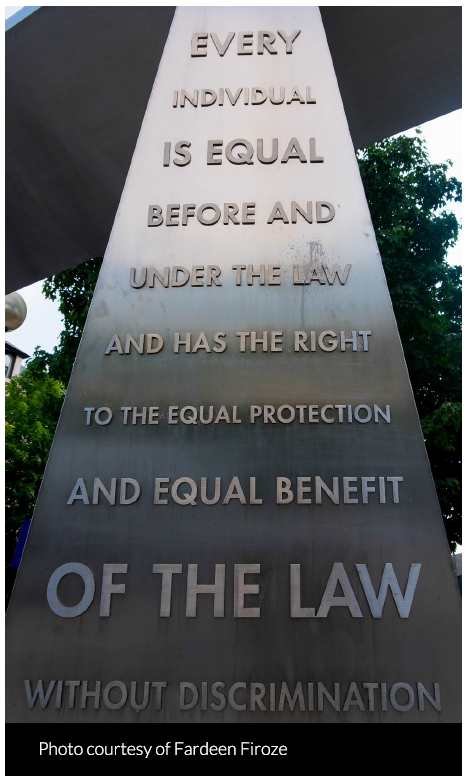


 I was among the fortunate employees selected for
I was among the fortunate employees selected for  One of my personal highlights was our visit to the
One of my personal highlights was our visit to the  September is Global RE Cares Month, when RELX employees are encouraged to use their volunteer hours to support their favourite charities. This year, LexisNexis Canada will offer its employees a variety of volunteer and fundraising activities. I will participate in many of them, but I will also be thinking about the great charitable work being done by my friends and colleagues around the world, whom I met last fall in South Africa.
September is Global RE Cares Month, when RELX employees are encouraged to use their volunteer hours to support their favourite charities. This year, LexisNexis Canada will offer its employees a variety of volunteer and fundraising activities. I will participate in many of them, but I will also be thinking about the great charitable work being done by my friends and colleagues around the world, whom I met last fall in South Africa.